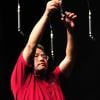
Music@Menlo is one of the country’s foremost chamber music festivals, and part of its success owes to its continuity of leadership. Founders Wu Han and David Finckel still run the artistic side, and when Edward Sweeney retired as executive director last week, he had been with the organization for 17 years.
Sweeney’s tenure coincided with the building up of the base of Music@Menlo into the smooth-functioning, sustainable machine it is today, comprising a professional concert series, a chamber music institute for students aged 10–19 (the Young Performers Program), and an advanced program for young artists aged 20–30 (the International Program). One of Sweeney’s signal accomplishments as executive director was to preside over the full funding of those educational programs so that they are both now tuition-free.
“It’s been kind of a trend nationally,” Sweeney said. “Several conservatories have gone that route, and I think we were just seeing in our application pools —it started out as anecdotal evidence — that kids would apply here and then end up going somewhere else. And when we followed up with them, oftentimes we would hear, ‘Oh, well that program was tuition-free.’ And we’re well aware of the cost when you have a kid studying music at a very high level, between the lessons and the summer camps and the travel and all that. Even for families with resources, it’s a very expensive proposition.”

Add in the cost of Bay Area housing, especially compared to other chamber programs located in rural areas or small towns, and it became clear to Sweeney and his board of directors that, in order to compete for the best students, the educational programs would have to become tuition-free. “I also think it’s kind of a prestige thing that when you get accepted to go to a conservatory or a summer music program and you have a full fellowship, that’s an acknowledgement of your playing and your ability,” Sweeney added.
With the board leading the way and Sweeney coordinating the efforts, Music@Menlo raised an extra $3 million during its 10th-anniversary campaign in 2012, one-third of which was earmarked for a rainy-day fund, the rest for special projects and such. The rainy-day fund is still there, and the other $2 million in seed money lasted twice as long as the original projection of five years. The latest campaign raised $6 million, ensuring that the educational programs will remain tuition-free for some time.
Like everyone at Menlo, Sweeney is most energized by the young musicians. He said proudly, “You can look around the country — we’ve got a map on our website, almost like one of those airline route maps — and see the number of series that have been started by students that have come through here.”

Sweeney is also aware of how audiences at the festival dote on the young musicians. “If there was a surprise when I arrived here, it was that there was such an enthusiastic and devoted community. And the partnership [between Music@Menlo and] Menlo School is amazing because of the synchronicity of the educational missions and obviously the incredible campus for us to be on. But it’s the educational mission that really resonates with our audience. All the performances by the students in our chamber music institute are free, and they’re the most popular thing that we do. Especially the young kids, we just fill the hall for those concerts.”
Sweeney also brought the organization through COVID-19 and is proud that Music@Menlo supported musicians during that time.
“COVID was a worse crisis for individual artists than it was for institutions,” he remarked. “And we were one of the few organizations that at least made partial payments on canceled contracts. We paid every musician half of the fee they would have gotten, and then we promised to reengage them, and we did. We actually brought back the entire [lineup for the] 2020 festival after COVID.
“What I learned was that you can’t wait until the crisis hits to figure out how to keep an organization going. We built a level of trust with our audience here so that it is like a family. So that when we face a challenging time, they step forward with support. But it’s because of all the work we did all the years before those crises.”




